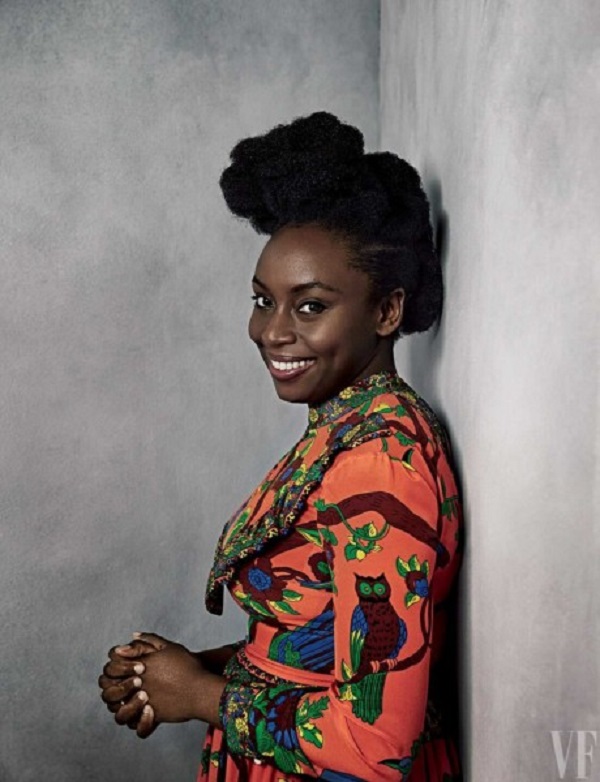
Chimamanda Ngozi Adichie is 41 today, 15 September. Surprising because we’ve known her from when she was 25, and in the 16 years since, it didn’t concretely occur to us that time was racing past. In these 16 years, she has become arguably our pre-eminent conversation starter in identity politics as well as the most influential Nigerian on the global level.
How best to weigh the special place she has come to occupy at the crossroads of literature, feminism, politics, fashion, and pop culture? Highlight each moment. To mark her attainment of age 40 last year, we decided to count down the 25 times we couldn’t stop talking about the most talked-about literary writer in the world. This year, we have updated the moments to 28. From 2003 to 2018: ranked. Did we miss anything? Is our ranking on point? Do sound off in the comments section.
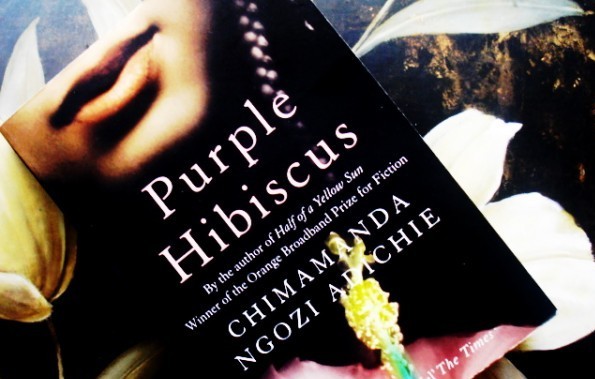
28. PURPLE HIBISCUS PUBLISHED (2003)
In October 2003, after a number of rejections, Purple Hibiscus was published by a small press, Algonquin Books. While it was her third publication, following the poetry collection Decisions (1997) and the play For Love of Biafra (1998), it was her first post-juvenilia work and the one that—backed by The Washington Post Book World‘s declaration of her as “the twenty-first century daughter” of Chinua Achebe—launched the legend we know today. The industry of Ebun Olatoye, Yemisi Ogbe, Jubril Lawal and the team at Farafina magazine ensured Chimamanda’s first public reading in Nigeria, in Lagos. The success of this event, writes Lawal, “led to the birth of NLNG involvement in literature.” The novel was shortlisted for the Orange Prize and longlisted for the Booker Prize, both in 2004; and it won the 2004 Hurston-Wright Legacy Award and the 2005 Commonwealth Writers’ Prize for Best First Book. There are no figures to prove this, but its piracy-induced ubiquity, particularly after being made required reading for examinations, suggest that it just might be the bestselling novel—and certainly the best known—of the current century so far in Nigeria.
27. PEN CONVERSATION WITH MICHAEL ONDAATJE (2005)
In April 2005, Chimamanda, fresh from making the Orange Prize shortlist but still a new sensation, scored a conversation with the revered Booker Prize winner Michael Ondaatje, whom she looked up to, at the PEN World Voices Festival. Titled “Reinventing Home,” the chat was introduced by another, two-time Booker Prize winner Peter Carey. Ondaatje asked her about Purple Hibiscus and she asked him about The English Patient, in an encounter which left her fan-girling. In a 2015 profile of her, Vogue mentioned Salman Rushdie’s initial impression of her from the Ondaatje conversation. “At the time she was just out of the egg, so to speak, and it was plain that she hugely admired Ondaatje,” he said, “but what was striking was her own confidence and authority. She very much held her own, and spoke fluently and powerfully, and all of us there that day could see that someone very remarkable had just arrived. A star is born, I remember thinking, and so it was.”
26. WINNING THE PEN PINTER PRIZE (2018)
In June, Chimamanda was awarded the 2018 PEN Pinter Prize—named after Harold Pinter, the 2005 Nobel Prize in Literature laureate—which honours a writer of “outstanding literary merit,” who is “unflinching, unswerving,” and demonstrates “fierce intellectual determination … to define the real truth of our lives and our societies,” joining an illustrious group that includes Margaret Atwood and Salman Rushdie. The panel praised her “refusal to be deterred or detained by the categories of others,” stating: “In this age of the privatised, marketised self, Chimamanda Ngozi Adichie is the exception who defies the rule. Sophisticated beyond measure in her understanding of gender, race, and global inequality, she guides us through the revolving doors of identity politics, liberating us all.” Commenting on her win, Chimamanda said: “I admired Harold Pinter’s talent, his courage, his lucid dedication to telling his truth, and I am honoured to be given an award in his name.” She will receive the Prize on 9 October, where she is also expected to announce her co-winner, who will receive the 2018 International Writer of Courage, meant for a writer “who is active in defence of freedom of expression, often at great risk to their own safety and liberty.”
25. CO-CURATING THE PEN WORLD VOICES FESTIVAL (2015)
In May, the first time the event would focus on a region, Chimamanda co-curated, with festival director Lazlo Jakab Orsos, the 11th PEN World Voices Festival of International Literature themed “On Africa.” The panels featured Kwame Dawes, Alain Mabanckou, Binyavanga Wainaina, Teju Cole, Boubacar Baris Diop, Nnedi Okorafor, Aminatta Forna, Chris Abani, Ntone Edjabe, Edwige Danticat, Yvonne Owuor, Billy Kahora, Achille Mbembe, Lola Shoneyin, Eltahawy, Zanele Munoli and Wangechi Mutu, alongside other artists from other parts of the world. At the end, Chimamanda delivered the Arthur Miller Freedom to Write Lecture.
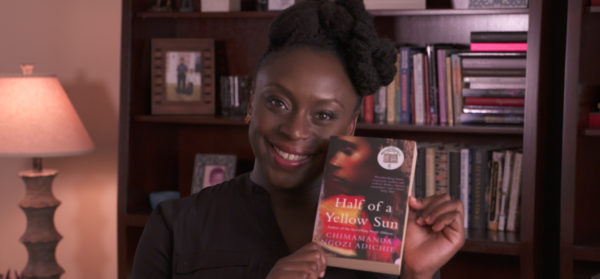
24. HALF OF A YELLOW SUN ARRIVES WITH A BLURB BY CHINUA ACHEBE (2006)
In September 2006, Half of a Yellow Sun was published by Alfred A. Knopf: with a rare blurb by one of the most revered writers then still working, Chinua Achebe. If there were questions of whether Chimamanda would live up to the hype, they died instantly. “We do not usually associate wisdom with beginners,” writes Achebe, “but here is a new writer endowed with the gift of ancient storytellers. [She] knows what is at stake, and what to do about it. Her experimentation with the dual mandate of English and Igbo in perennial discourse is a case in point. Timid and less competent writers would avoid the complication altogether, but [she] embraces it because her story needs it. She is fearless, or would not have taken on the intimidating horror of Nigeria’s civil war. Adichie came almost fully made.” The blurb, much-cited in publishing, became symbolic: a Great Writer formally handing over to his successor; and was the front cover blurb for her two subsequent books. The acclaim was rapturous, the awards recognition prominent: it won the Orange Prize, the Anisfied-Wolf Book Award, the PEN “Beyond Margins” Award, and was a finalist for the National Book Critics Circle Award. In 2015, it placed at No 10 in BBC Culture’s “The Greatest Novels of the 21st Century So Far,” and was chosen by The Independent Bath Literature Festival—who considered books in the year they were eligible for awards—as the Best Book of 2007.
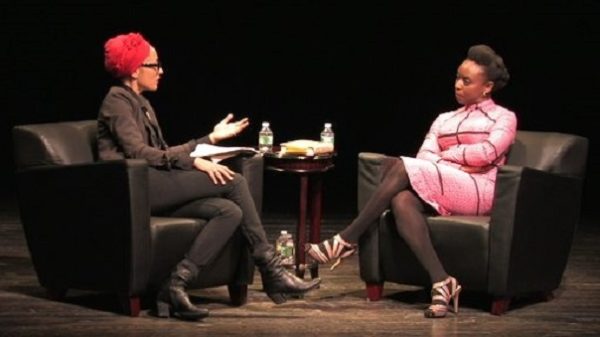
23. CONVERSATION WITH ZADIE SMITH (2014)
At the Schomburg Center in New York Public Library, Zadie Smith moderated an insightful conversation with Chimamanda in which they discussed Americanah, writing, race, classism, racism, and the uneasy relationship between African Americans and Non-American blacks. The significance of the pairing was not lost on fans: the two leading black female novelists talking literature and politics and having fun.
22. COMMONWEALTH LECTURE (2012)
Called upon for the Commonwealth Lecture themed “Connecting Cultures,” Chimamanda’s speech, “To Instruct and Delight: A Case for Realist Literature,” used analogies from childhood to paint of picture of the impact that literature could have in altering perceptions and bridging cultures.
21. INTERVIEW WITH OLISA TV (2015)
Following years of controversies about her comments on the Caine Prize, black women’s hair, and every other controversy that comes with merely being Chimamanda Ngozi Adichie, she granted her most personal interview yet to Olisa TV. Divided into Parts One and Two, her opinions and clarifications were as unapologetic and candid as they’d always seemed.
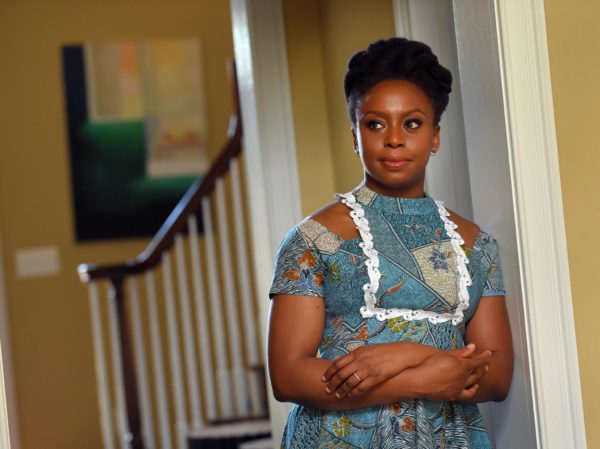
20. TRIBUTE TO MICHELLE OBAMA (2016)
As part of The New York Times’ commissioned tributes to Michelle Obama in October 2016, titled “To the First Lady, with Love,” Chimamanda paired observation and affection in pulsating prose that centered on Michelle’s efforts to balance her race, intellect, background and responsibility in the public glare. During her farewell interview with Michelle Obama in the White House, Oprah Winfrey said, “That was one of the most beautiful things I’d read about you. I thought she summed it up for all of us.” And Michelle said, “I wrote her a thank-you letter,” and then, “That, that was…that moved me.”
19. AMERICANAH OPTIONED BY LUPITA NYONG’O (2014)
A year after its release, Oscar winner Lupita Nyong’o came calling for Americanah. It was optioned for film, to be produced by Brad Pitt’s company Plan B alongside Lupita and Andrea Calderwood who had produced Half of a Yellow Sun. Later, Golden Globe nominee and Selma star David Oyelowo was cast to play Obinze.
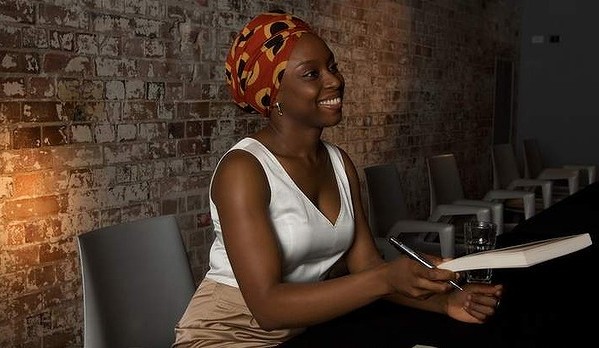
18. INCLUSION IN TIME 100 (2015)
In April 2015, TIME named Chimamanda among “The 100 Most Influential People in the World.” Her profile, titled “Conjurer of Character,” was written by the magazine’s deputing managing editor Radhika Jones: “her greatest power is as a creator of characters who struggle profoundly to understand their place in the world.” Japan’s Haruki Murakami was the only other novelist included. Remarkably, when her friend Binyavanga Wainaina was named in the list in 2014, Chimamanda had written his profile.
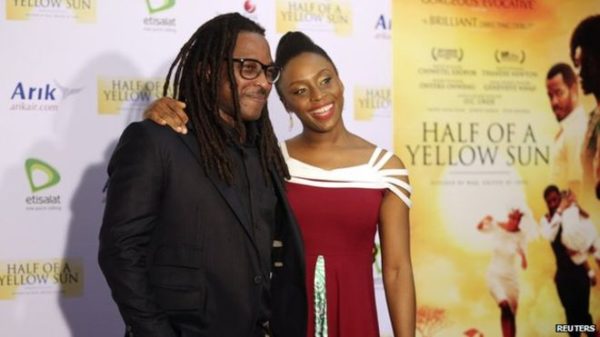
17. HALF OF A YELLOW SUN FILM PREMIERES (2013)
Director Biyi Bandele’s casting for Half of a Yellow Sun was superb, the acting committed: BAFTA winner Thandie Newton as Olanna, 12 Years a Slave star Chiwetel Ejiofor as Odenigbo, the rising John Boyega as Ugwu, Anika Noni Rose as Kainene, Joseph Mawle as Richard, music icon Onyeka Onwenu as Mama, and Nollywood queen Genevieve Nnaji as Miss Adebayor. But Nigerians weren’t satisfied: Genevieve’s casting in a small role was irritating; and Thandie wasn’t black enough for her lead role. The critical reception might not have been enthusiastic but Chimamanda’s work had a new audience. Her only requirement had been that the film be shot in Nigeria.
16. “HER TYPE OF FEMINISM IS NOT MINE” (2016)
Back in 2014, Chimamanda had defended Beyonce against critics: “Whoever says they’re feminist is bloody feminist.” But after two years of refusing to further discuss the Beyonce feature, Chimamanda, in an interview with the Dutch newspaper de Volkskrant, dropped this epic line: “Her type of feminism is not mine.” Critics of Beyonce’s feminism smiled, the Internet cried shade!, and a tussle began between the Bey Hive and The Society of Chimamanda’s Boys and Girls over who gained more from their collaboration.
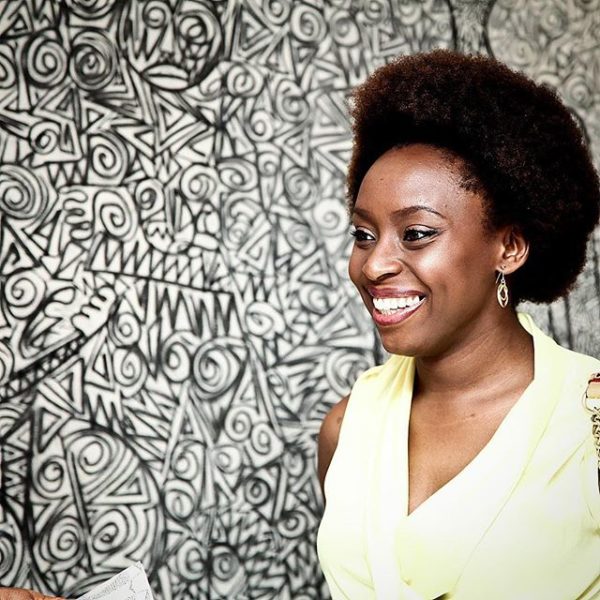
15. HALF OF A YELLOW SUN NAMED THE BAILEYS PRIZE’S “BEST OF THE BEST” (2015)
Nine years after its publication, eight years after winning the Orange Prize, Half of a Yellow Sun was named the Baileys Prize’s “Best of the Best” for the 2006-15 decade. The honour, for the best ever novel to win the Baileys Prize in the ten years in focus, was decided by judges but in a fan-voted poll, Half of a Yellow Sun still came out on top. The honour was significant given that, in her home country of Nigeria, a new wave of the pro-Biafran movement had just begun.
14. AMERICANAH PUBLISHED (2013)
Seven years after her last fresh work of fiction, Americanah arrived in April 2013. The question, for some, was: Did she top her last? But then Great Artists never repeat themselves. In Americanah, Chimamanda had set another standard in ambition, range and execution, and in arguably her best prose yet. It swept everything from race and class to blogging and hair, was trailed by critical acclaim. For The New York Times, “It never feels false,” and it was named among the Best Ten Books of 2013 on theirs and other lists, en route to taking the National Book Critics’ Circle Award for Fiction and the Chicago Tribune Heartland Prize for Fiction, and garnering her a then record-tying third shortlisting for the Baileys Prize. In 2015, it placed at No 13 in BBC Culture’s “The Greatest Novels of the 21st Century So Far.” It spent 78 weeks on NPR’s Paperback Bestseller List and reached No 179 on Amazon’s list of 10,000 bestselling books. By 2015, it had shifted 500,000 copies in the U.S. The book was featured in Season 4 of the hit TV series Orange Is the New Black.
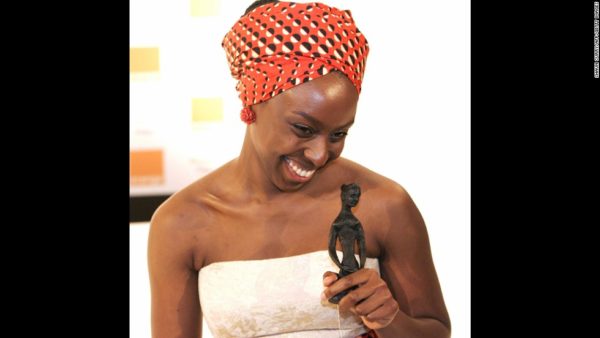
13. HALF OF A YELLOW SUN WINS THE ORANGE BROADBAND PRIZE FOR FICTION (2007)
Even before winning the Orange Prize, Chimamanda’s second novel had cemented her relevance on the global literary scene, critically and commercially, with UK sales perched at 187,000 paperback copies. After winning it, the book shifted 525,438 copies according to a 2010 Nielsen BookScan report. It remains the third bestselling Orange Prize winner ever, after Andrea Levy’s Small Island and Lionel Shriver’s We Need to Talk about Kevin, with all three novels having outsold every Booker Prize winner except Yann Martel’s Life of Pi.
12. SHUTTING DOWN A TRUMP SUPPORTER ON BBC NEWSNIGHT (2016)
In the heat of the U.S. presidential election, after her fictionalisation of Donald Trump, BBC Newsnight invited Chimamanda to discuss whether Trump had been racist. R. Emmett Tyrell Jr., editor of the conservative The American Spectator and a staunch Trump Supporter, was there, and quickly, things went awkward. His approach was condescending: “I don’t really respond to the election the way this lady does. I don’t respond to it emotionally.” Her clapback was an epic lecture on white and gender privilege: “I’m sorry but if you’re a white man, you don’t get to define what racism is.” Afterwards, Tyrell Jr. published an angry, insular, (sexist!), pretentiously dismissive piece in The Washington Times. Chimamanda told her version of events on Facebook, about how she felt “ambushed” after not being told until the last minute there she would not be alone. “We’re sad and sorry,” BBC Newsnight commented with an apology.
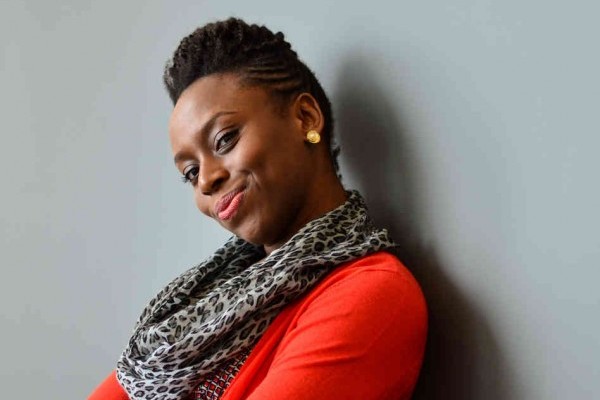
11. AMERICANAH WINS “ONE BOOK, ONE NEW YORK” (2017)
Nominated by the actress Bebe Neuwirth and up against Betty Smith’s A Tree Grows in Brooklyn, Junot Diaz’s The Brief Wondrous Life of Oscar Wao, Ta-Nehisi Coates’ Between the World and Me and Paul Beatty’s The Sellout, 50,000 New Yorkers voted to make Americanah the book they would all read at once. The development, and the novel’s impending passage of the million mark, stirred a conversation on whether Americanah has become her signature novel. Afterwards, Orange Is the New Black actress Danielle Brooks met prison inmates and fans to discuss the novel.
10. UNITED NATIONS WORLD HUMANITARIAN DAY ADDRESS (2016)
Tapped by the United Nations for the keynote speech on World Humanitarian Day, Chimamanda went up there and, opening with a story of her parents’ accommodation by a friend during the Biafran War, unspooled pointed and elegant words about the need to see the humanity and complexity of others. “Nobody is ever just a refugee. Nobody is ever just a single thing,” she said. “Let us tell a different story. Let us tell the story differently.” It was a reminder, as if one were needed, that storytelling, when applied rightly, does move us more than simple logic can.
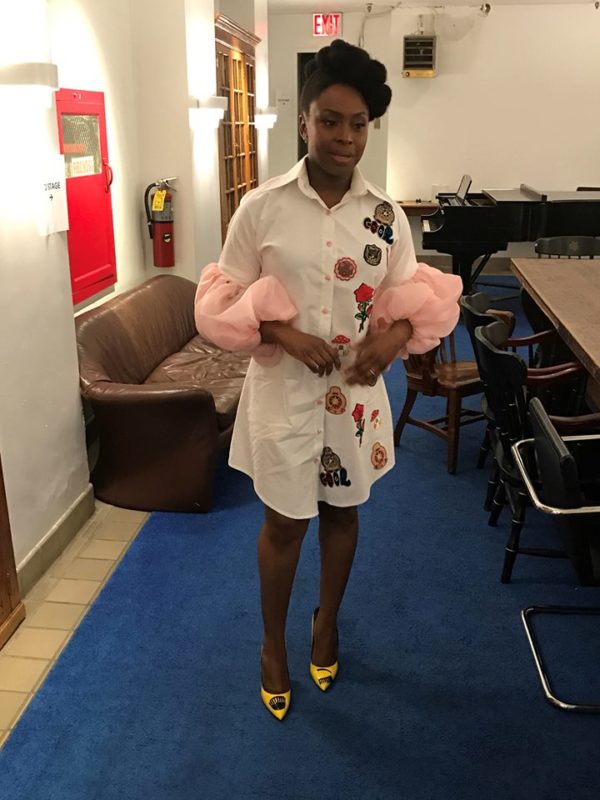
9. HILARY CLINTON’S TWITTER BIO
At the 2018 PEN World Voices Festival, where Hilary Clinton delivered the Arthur Miller Freedom to Write Lecture, a lecture Chimamanda herself had delivered in 2015, the two were in conversation, a pairing suggested by the 2016 US Presidential candidate and former First Lady. It began beautifully, Chimamanda expressing unreserved admiration for a woman she would eventually call “Aunty,” until she asked why Hilary’s Twitter bio led with “wife” when her husband Bill’s didn’t lead with “husband.” “In your Twitter account, the first word that describes you is wife. And then I think it’s mom, and then it’s grandmother,” she said. “And when I saw that, I have to confess that I felt just a little bit upset. And then I went and I looked at your husband’s Twitter account, and the first word was not husband.” Her bio at the time read: “Wife, mom, grandma, women+kids advocate, FLOTUS, Senator, SecState, hair icon, pantsuit aficionado, 2016 presidential candidate.” Hilary gave a convincing reply, but was even more convinced by Chimamanda’s punchline-phrased question, and added, “When you put it like that, I’m going to change it.” While the conversation was ongoing, American media outlets made headlines out of the question, and soon, expectedly, Nigerians bought the case. She trended heavily on Nigerian Twitter and Facebook and everywhere online, coming in for criticism which overlooked that she did ask Hilary whether her question was a fair one and to let her know if it wasn’t, criticism which focused on her use of the word “upset.” It was an astonishingly overenergized controversy, a ridiculous one as well going by how deep and sustained it ran. It came to a halt when Chimamanda decided to respond on Facebook, in a post titled “Dear Unnamed Person Who I Am Told Is On Social Media Saying I am Her Family and Telling Me to Shut Up.” It was her being her most Nigerian yet. “We all react personally to public figures,” she wrote. “And I was upset that the Twitter bio of a woman who is the most accomplished person to run for President of the United States, would begin with ‘wife.’ Considering her personal history, it just didn’t seem to fit. I felt that ‘wife’ was used as an attempt to placate all the men and women who will not vote for a woman unless they are able to see her first in domestic terms.” Afterwards, Hilary Clinton changed her bio to “2016 Democratic Nominee, SecState, Senator, hair icon. Mom, Wife, Grandma x2, lawyer, advocate, fan of walks in the woods & standing up for our democracy.”
8. “WE SHOULD ALL BE FEMINISTS” (2013)
When Chimamanda was called up to deliver the talk that, as TIME puts it, ensured she “found her voice as cultural critic” (sic), she was still writing it. But after she finished speaking, the world had awoken to the subtle ways in which women are belittled and dismissed, and feminism, with the overlooked instances she highlighted, began generating new, refreshing debates. It was here that her crossover began. Published as a booklet in 2014, it was made required reading for sixteen-year-olds in Sweden. A video from the 2017 Glamour Women of the Year Awards showed Oscar winners Nicole Kidman and Jennifer Hudson, Kristen Stewart, James Corden, Amy Poehler and Winnie Harlow performing excerpts from the talk.
7. BOOKSHOP CLAPBACK AND POSTCOLONIAL THEORY SHADE
We’re putting these two talking points under one heading because, even though each generated enough heat on their own, they both happened at The Night of Ideas, a cross-continental cultural event held by the Institut Francais at the Quai d’Orsay in Paris, on 25 January 2018, in her interview with French journalist Caroline Broué—an event we have covered in greater detail and with crucial context here.
First, the bruisingly brilliant clapback. The accomplished Broué began the interview well, with good questions about feminism, gender equality, ideals of beauty, and Adichie’s writing. Until she decided to ask Adichie a rather oddball question: “Are there bookshops in Nigeria?” The moment she asked the question, a wave of murmurs swept across the room. Everyone realized instantly what was wrong with such a question. Broué tried to clarify things. But her response, as is evident in the quote below, wasn’t any better than the question: “You were talking about single story…In France there is not much said about Nigeria but when people talk about Nigeria it’s about Boko Haram, its about violence, its about security. I should like you to tell us something about Nigeria which is different…talk about it differently…and that is why I am saying are there book shops. Of course I imagine there are.” Adichie’s answer was a condensation of all that was problematic about the question, an answer that should go down as the greatest Adichie clapback yet: “I think it reflects very poorly on the French people that you have to ask me that kind of question.” Despite Adichie’s own effort to quell the subsequent ridiculing of Broué—“I now know that she was trying to be ironic, to enlighten by ‘impersonating the ignorant,’ but because she had not exhibited any irony until then, I didn’t recognize it. Hers was a genuine, if flat, attempt at irony and I wish she would not be publicly pilloried”—nothing was going to stop the field day social media was having. As a follow-up, pop culture magazine Dazed even got together eight Nigerian writers to discuss the country’s reading culture.
Then the drop-the-mic-moment shade on Postcolonial Theory. The rest of the interview went on incident-free until the floor was opened for questions. A young man, who felt the question of race had not been addressed in the interview, asked Adichie about her position on race. He ended with the question: “What is your vision on Post-colonial theory?” First Adichie responded with the tongue-and-cheek comment: “Are you studying post-colonial theory? Because I don’t want to do your assignment for you.” It got a good laugh. After addressing his question on race and taking him up on his view on feminism, Adichie then said: “Post-colonial theory? I don’t know what it means.” And then with a straight face: “I think it’s something that professors made up because they needed to get jobs.” While excitement and praise raged for her earlier clapback, there was swift, uncompromising pushback for the comment: She was anti-intellectual and politically naïve, she was discrediting scholarly work even with her masters in African Studies from Yale, she was knocking down the same ladders with which she had ascended, and there were contradictions in her position pointed out as well.
For a more detailed analysis of the interview, read our coverage.
6. “THE DANGER OF A SINGLE STORY” (2009)
In her first TED Talk, Chimamanda draws on her Igbo culture, her experiences in the U.S. and domestic stories of class divisions to explain how nkali, the concept of being greater than, births and sustains the reduction of whole cultures to stereotypes, making a powerfully persuasive case against the ill-informed treatment of Africa in the global discourse. It became one of the most viewed TED Talks and is currently at nine million views. Most importantly, it made her a talk sensation, led to years of sold-out arenas, and as Vogue puts it, began her change “from a successful author into a celebrity.”
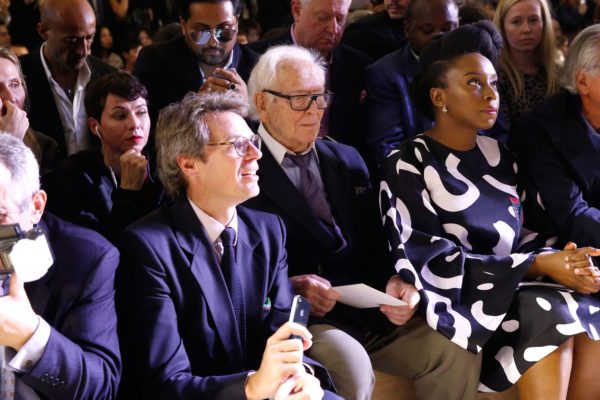
5. SAMPLING BY DIOR (2017)
In a powerful statement, the fashion powerhouse Dior’s first female creative director in 70 years, Maria Grazia Chiuri, had models walking the runway at her Spring 2017 Collection show, wearing T-shirts imprinted with “We Should All Be Feminists.” While her words boomed from the speakers, Chimamanda, the show’s guest of honour, sat in the front row in the hall which had Rihanna, Jennifer Lawrence and Kate Moss, among other celebrity A-listers.
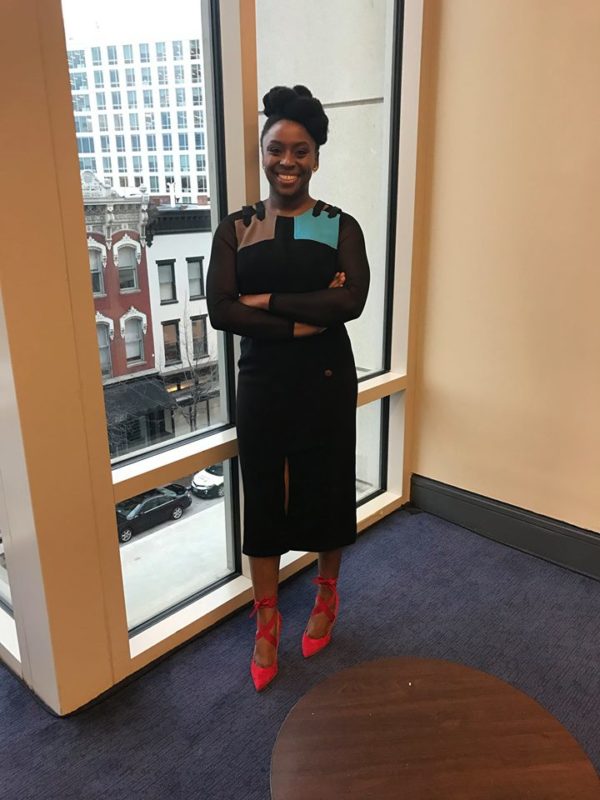
4. SAMPLING ON BEYONCE’S “***FLAWLESS” (2013)
As though it wasn’t surprising enough that Beyonce dropped her self-titled fifth album unannounced, she went one further by scoring a collaboration with Chimamanda. The second verse on “***Flawless” comprises lines from “We Should All Be Feminists.” As unlikely as it would have seemed, it was a match made in fans’ heaven, one that peaked at the 2014 MTV VMAs when, during her performance, Beyonce perfected a power pose as Chimamanda’s words boomed in the arena. “I was immediately drawn to her,” Beyonce said. “She was elegant and her words were powerful and honest. Her definition of a feminist described my own feeling: equality of the sexes as it pertains to human rights, equal pay and sexuality. She called the men in her family feminists, too, because they acknowledged the need for equality.” The feature earned Chimamanda a Grammy nomination off the mother album, Beyonce.
3. “TRANS WOMEN ARE TRANS WOMEN” (2017)
In a video interview with Channel 4, in response to a question about the place of transgender women in feminism, Chimamanda said, “Trans women are trans women.” And not women? The backlash was swift, furious, merciless and deep. She made attempts at “clarifying,” twice, but the Internet was already ablaze, birthing countless think pieces on how trans people are misunderstood, simplified and reduced.
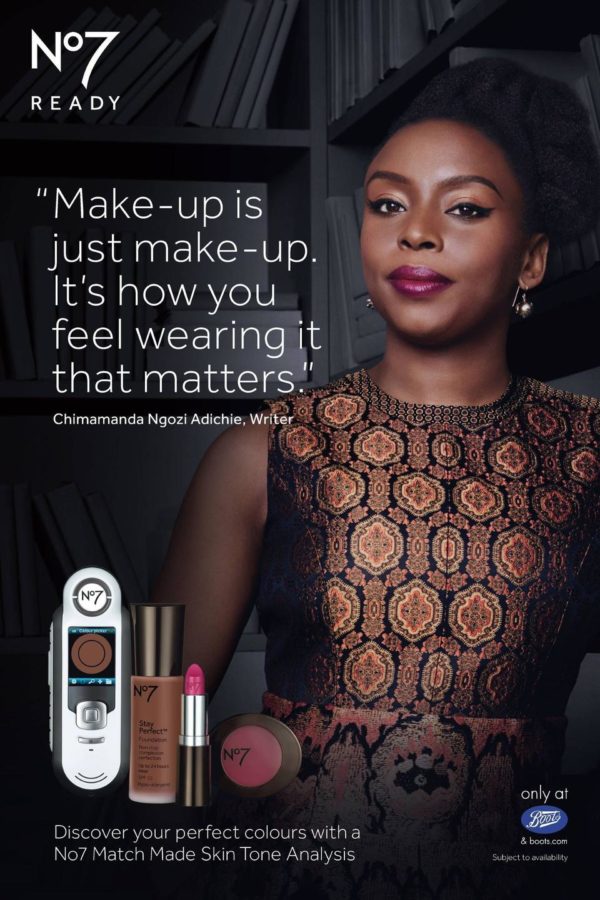
2. BOOTS NO 7 ENDORSEMENT (2016)
The announcement of Chimamanda as the new face of the makeup company Boots No7 was surprising on several levels—she was a writer, she was a feminist—and, amidst the cheers, raised concerns about the fate of intersectional feminism at the hands of capitalism. It didn’t matter so much, and CNN found itself asking: “Is Chimamanda Ngozi Adichie the Most Influential Woman in Africa Right Now?”
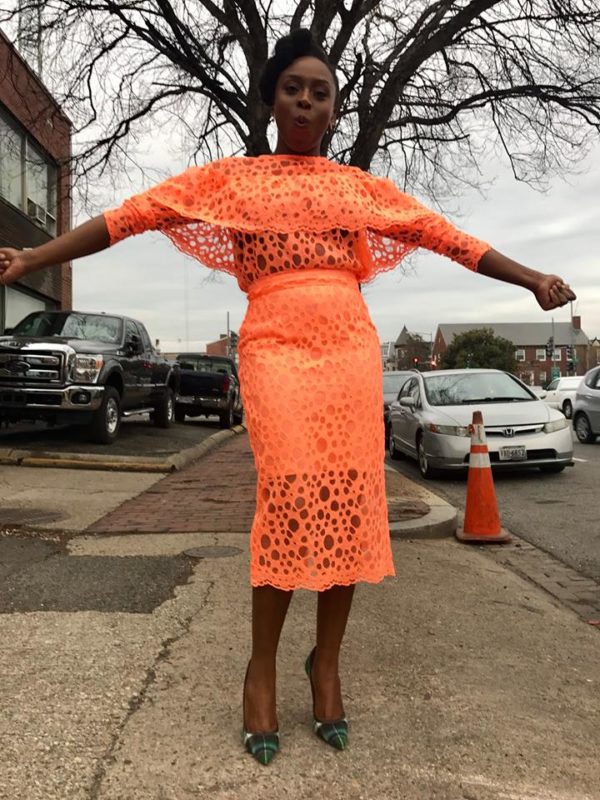
1. “DEAR IJEAWELE” DEBUTS ON FACEBOOK (2016)
On the morning of October 16, Chimamanda surprised the world by dropping the most detailed, most relatable 9,000 words on feminism one can find anywhere. Her suggestions were practicable: they were powerful and persuasive. Was it a major statement, her posting on Facebook an essay that any A-list publication would be too happy to publish? Whatever it was, it did launch her social media visibility, and on that morning, we went mad with awe. On publication as a booklet in 2017, Dear Ijeawele, or A Feminist Manifesto in Fifteen Suggestions debuted at No 4 on The New York Times Nonfiction Bestseller List and won the Le Grand Prix De L’heroine Madame Figaro, her first award for nonfiction. Her tour for the book saw fans displaying quotes from it and she herself slaying fashion looks.


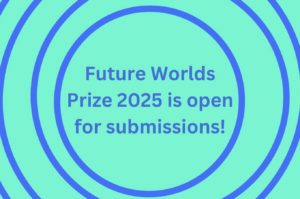
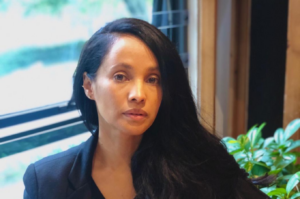
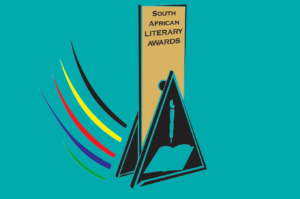
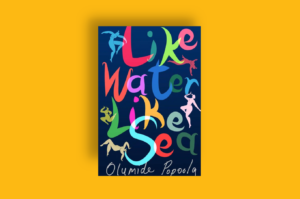
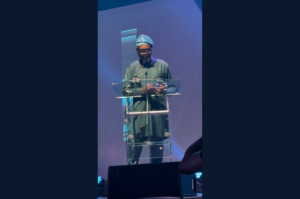


Chimamanda Ngozi Adichie – Fight For Feminism November 13, 2021 19:18
[…] Chimamanda Ngozi Adichie: 28 Most Talked-About Moments of Her Career (Updated for 2018) […]